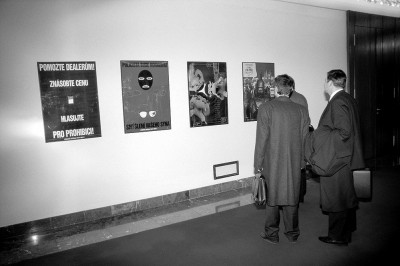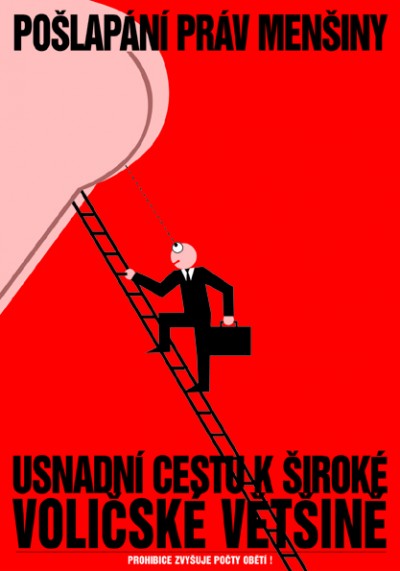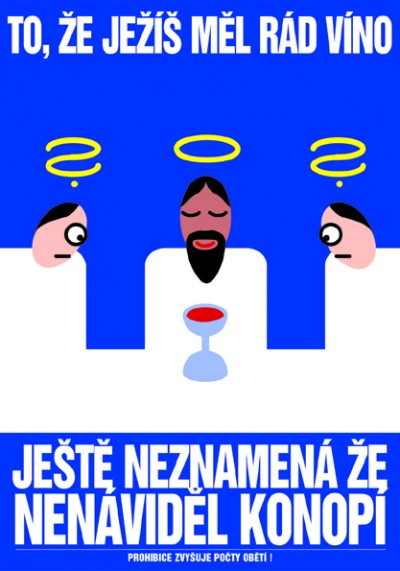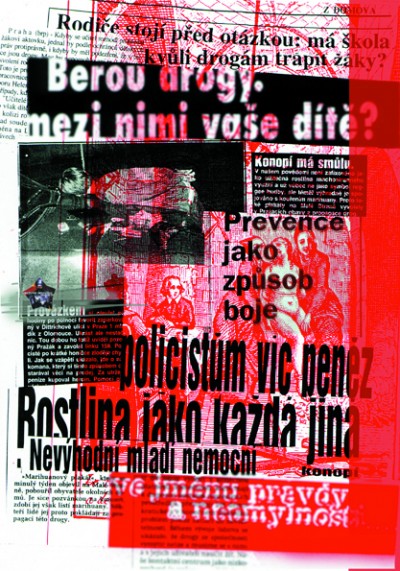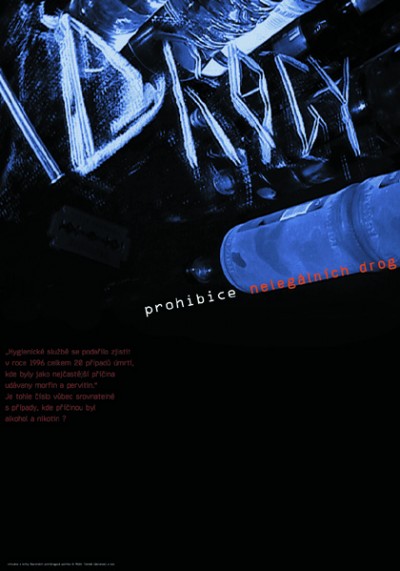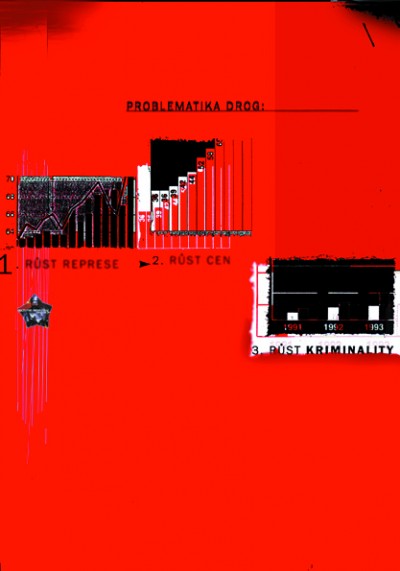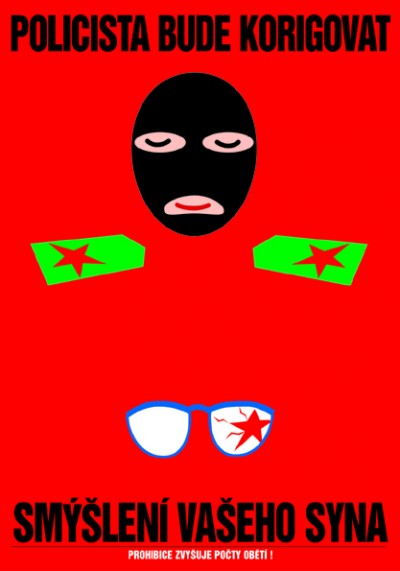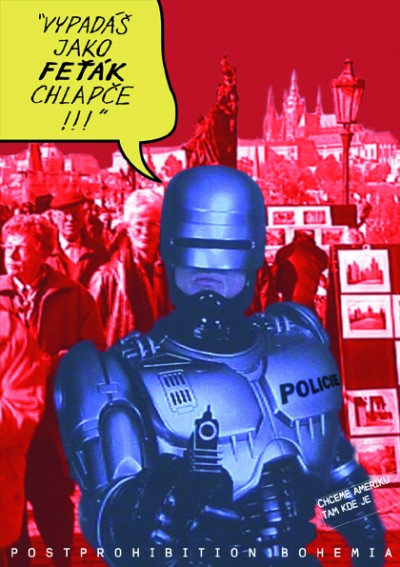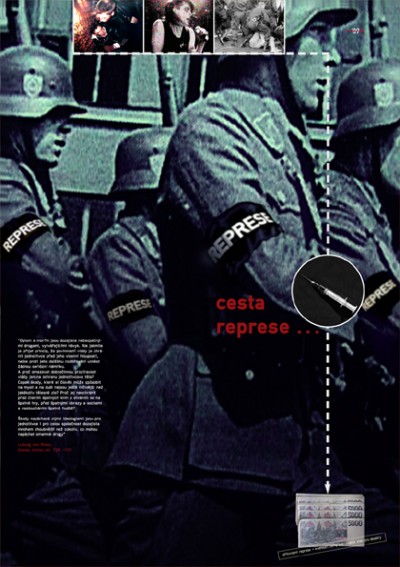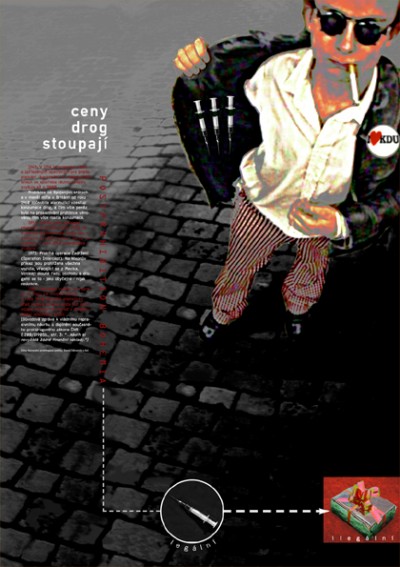Prohibition of the Parliament, 1998
Installation in the Parliament of the Czech Republic, Prague, February 1998
Pode Bal’s first project was conceived for the specific context of the Czech Parliament. At the time an amendment that would criminalize all illicit drug users had been proposed. Anyone caught in possesion of any drug “in the amount of greater than small” would have a good chance of serving a sentence in jail for up to several years. Pode Bal created a collection of 16 posters charging the involved political parties with irrisponsible populism. The exhibition was installed without anyone controling its content and sparked some very sharp reactions from several politicians. As a result, the issue drew media attention, which was absent before the exhibition.
This project was drafted as a protest against the forthcoming amendment of the “drug law” §187a. Pode Bal considered
this amendment an infringement on civil liberties. The action claimed that “prohibition is not a solution“. The posters were
created for the space of the House of Parliament and were installed there during the week when the bill was in its third reading.
Media about the project
A peculiar, even allegorical sensitivity to the freedom of speech is demonstrated by the People’s party deputies who fight for legislation enabling the arrest of drug consumers. This Parliament-hosted exhibition expressing juxtaposed opinions has outraged them so much that they called for a parliamentary commission and got the police involved.
One of the People’s party deputies, whose name appeared on a poster saying that repression is a populist solution, has even called the police and asked them to investigate whether the poster and its display isn’t against law. The exhibition will be discussed in the following days when, besides the police, it will be examined by a commission of parliamentary deputies.
MF Dnes (February 11, 1998)
Pode Bal cut its artistic teeth with an exhibition in the foyer of Parliament that sparked nationwide debate in February 1998.
As a bill proposing hefty punishment for the possession of more than a small amount of illicit drugs was going into its third and final reading, the group presented a series of posters highlighting the weaknesses of the bill. It was a baptism by fire for an art group that has since created a series of exhibitions commenting on hypocrisy in society - a group that aims to spark discussion.
The Prague Post (19. – 25. 1. 2000)
Václav Klaus (ODS – Civic Democratic Party) about the project
“Some of my parliamentary colleagues consider this exhibition as a breakthrough in the direction of drug legalization. I don’t think so – I feel that this exhibition attracted attention of the members of parliament. That’s fine, a piece of art should work this way.“
Reflex (March 12, 1998)
Pavel Severa (Christian Democratic Party / Peoples’ Party) about the project
“I don’t think that the premises of the Parliament’s foyer should serve for lobbying for any groups in any sense or extent. That is a space for art works and I don’t want to live up to the moment when some company will exhibit airplanes, guns, or something in here (...) It is a place for paintings and statues.“
Reflex (March 12, 1998)
Pode Bal about the project
The taboo subject of drugs was politically abused. An over-whelming majority of the public doesn’t know anything about the problem but still the word “drugs“ sparks various psychosomatic reactions just like the word “devil“ once used to. That is why most politicians stylize themselves into the role of inquisitors, or uncompromising crusaders against drugs, while they know very well (or are not clever enough to know) that similar efforts are not only useless but – as history has shown – have the opposite effect. Regardless of the fact that the spent tax money and shouting of politicians will have a bad or no effect on the drug situation in the Czech Republic, one thing is for sure: there will always be people who say to themselves: “This People’s Party is a bit slimy, but at least they will do away with the junkies“ And they will vote them. After some thought perhaps even the drug dealers will go and vote for them too, as this amendment ensures them a flourishing black market and higher prices.
The amendment is mainly a populist move – a hypocritical lie with cream and a cherry on top. The Majority will swallow it with joy, without ever looking at the bill. We can really doubt the moral qualities of our politicians: either they unscrupulously lie or they are so weak-minded to believe that an approach that has never worked anywhere will succeed in our country. In the first case it might seem that these people don’t care if their voters do drugs, as long as they vote for them. In the second case commentary is needless.
We simply feel conned. This problem touches all of us whether we take drugs or not, it directly limits our freedom in this decision. We don’t acknowledge that a pack of ambitious morons we support from our taxes can tell us what we can and cannot consume. We don’t want to empower the police to be able to find things “in the amount of greater than small” in the pockets of troublesome people.
Unfortunately we couldn’t expect our exposition to have a big influence of on the course of decision-making but we tried our best and that is a responsibility we feel towards the problems around us. Our goal in this case was mainly to fuel the dialogue about this problem and to express our support to the professionals, as they should be dealing with the country’s drug situation – and not populists, crackpots and smart-asses like Severa, Vacek, Matulka, Borník, Tomášek and the like.
